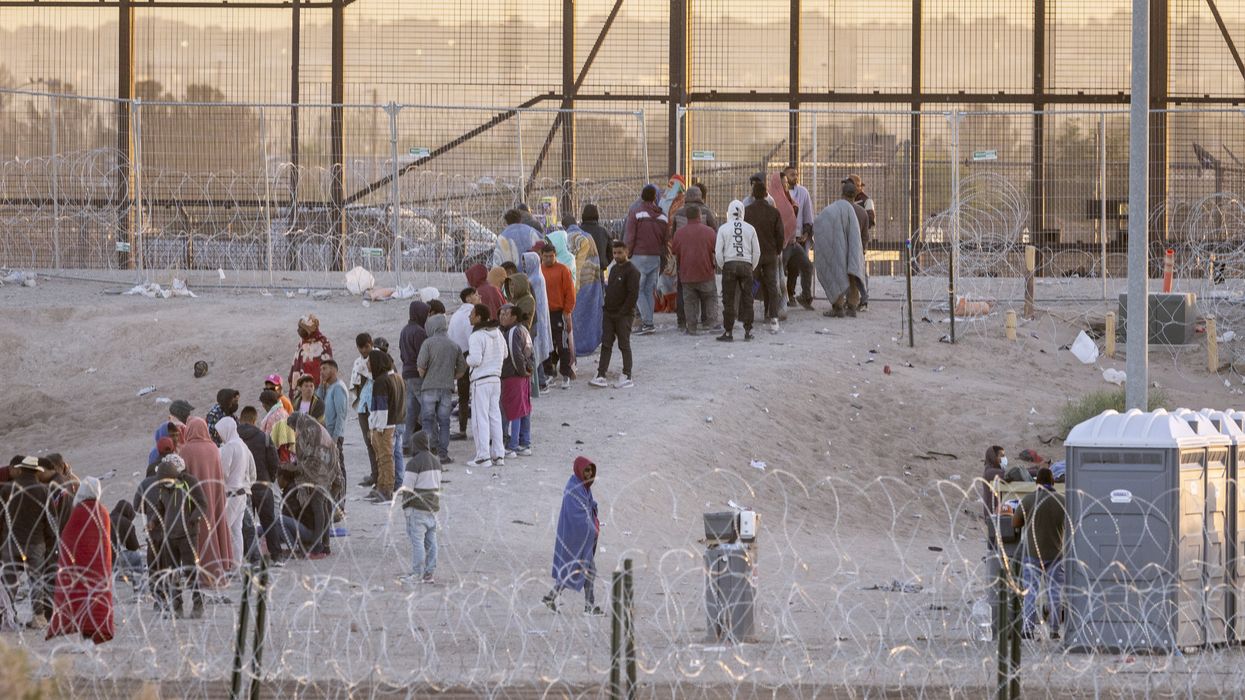
John Moore/Getty
Outsourcing giants are gaming the system — at Americans' expense.
Big Tech is taking advantage of America’s broken immigration system, and Americans are suffering because of it.
Last week, a jury unanimously found Cognizant, an outsourcing and IT consulting firm founded in Chennai, India, and based in New Jersey, guilty of discriminating against American workers by abusing the H-1B visa program. According to an attorney for the plaintiffs, “Individuals who were not Indian [or] South Asian, were 8.4 times more likely to be terminated from the bench than individuals who fit the preferred category - the Indian nationals.”
An America-first immigration policy is not one where talented foreigners find it impossible to immigrate to the US. Nor is it the current system, where low-skilled workers are able to pretend to have distinguished ability to work jobs that do not even exist.
What’s more, South Asian employees were terminated at a 1% rate, compared to 27%, 20%, and 9% for black, Hispanic, and white employees, respectively.
In a conversation with Kevin Lynn, director of the Institute for Sound Public Policy and founder of U.S. Tech Workers, he stressed the importance of the verdict since he believes that “this verdict will loudly echo in boardrooms, legislatures, and government agencies for the next decade and will help right the ship when it comes to protecting our domestic workforce. No longer can policymakers look the other way when it comes to both enforcing the letter of our immigration laws and prosecuting instances of discrimination.”
Following the guilty verdict, Cognizant announced that it will appeal the decision and denied any accusations of discrimination.
“We provide equal employment opportunities for all employees and have built a diverse and inclusive workplace that promotes a culture of belonging in which all employees feel valued, are engaged and have the opportunity to develop and succeed,” the company said.
However, plaintiffs in the lawsuit uncovered that over the past 20 years, Cognizant had been liberally handing out H-1B visas to Indian workers, undercutting wages and displacing American workers. According to plaintiffs, Cognizant became one of the largest recipients of H-1B workers, partly by submitting visa applications for nonexistent jobs.
In 2016, Dr. Jean-Claude Franchitti, a French citizen with a Ph.D. in computer science, was fired from Cognizant after reporting that he was asked to sign hundreds of fraudulent letters regarding H-1B visa applications for these nonexistent jobs.
The lawsuit claims that Dr. Franchitti’s manager “would staff the client projects with visa-holding employees from India, rather than non-Indian members of [his] group who were already in the U.S. and available for this work.”
The H-1B visa program was originally created to give companies temporary access to high-skilled foreign workers in specialty occupations. Theoretically, to fill labor shortages, H-1B visas should only be given to foreign nationals who have exhibited “distinguished merit and ability.”
But in reality, many of these H-1B visa holders are just run-of-the-mill individuals who do not have any sort of extraordinary talent or skill compared to the many unemployed Americans who possess similar, if not better, skills. Like Cognizant, some corporations have abused this program to flood the labor supply and undercut American wages in job markets where there is no labor shortage.
In isolation, a labor supply shock caused by immigration places downward pressure on wages. But in theory, immigrants will later increase the demand for labor, growing existing industries or perhaps even creating new industries (i.e., jobs).
But this doesn’t happen if corporations apply for work visas for jobs that do not even exist or discriminate against workers based on whether they come from India or not, so they can get away with paying their workers as little as possible.
Unfortunately, America’s broken immigration system fails to foster a competitive environment where the best and the brightest from around the world come to America to create American jobs. Because of America’s seemingly arbitrary and non-meritocratic visa system, low-skilled, lower-wage workers often harm American wages while simultaneously taking the place of high-skilled, talented workers worldwide and preventing them from contributing to the American economy.
So the American immigration system needs a complete overhaul. An America-first immigration policy is not one where talented foreigners find it impossible to immigrate to the U.S. Nor is it the current system, where low-skilled workers are able to pretend to have distinguished ability to work jobs that do not even exist. Instead, America’s current guest-worker programs must be replaced with a new system that is genuinely meritorious — corporations should hire top-rate global talent for top-rate salaries, not mediocre foreign workers for mediocre salaries.
With less than a month until the presidential election, illegal immigration remains a top concern for many Americans. Just as importantly, the incoming administration must urgently and comprehensively address reforming legal entryways into the U.S. Until merit becomes the primary prerequisite for obtaining a work visa, American workers will continue to bear the costs of the broken immigration system.
Ethan Xu